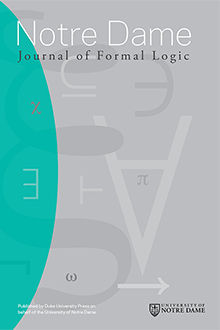Abstract
We show that for every countable recursively saturated model M of Peano arithmetic and every subset , there exists a full satisfaction class such that A is definable in without parameters. It follows that in every such model, there exists a full satisfaction class which makes every element definable, and thus the expanded model is minimal and rigid. On the other hand, as observed by Roman Kossak, for every full satisfaction class S there are two elements which have the same arithmetical type, but exactly one of them is in S. In particular, the automorphism group of a model expanded with a satisfaction class is never equal to the automorphism group of the original model. The analogue of the first result proved here for full satisfaction classes was obtained also by Roman Kossak for partial inductive satisfaction classes. However, the proof relied on the induction scheme in a crucial way, so recapturing the result in the setting of full satisfaction classes requires quite different arguments.
Citation
Bartosz Wcisło. "Full Satisfaction Classes, Definability, and Automorphisms." Notre Dame J. Formal Logic 63 (2) 143 - 163, May 2022. https://doi.org/10.1215/00294527-2022-0013
Information





